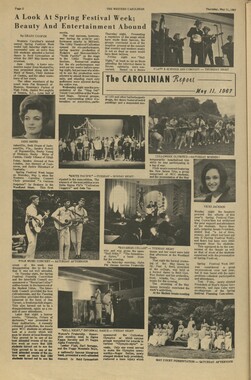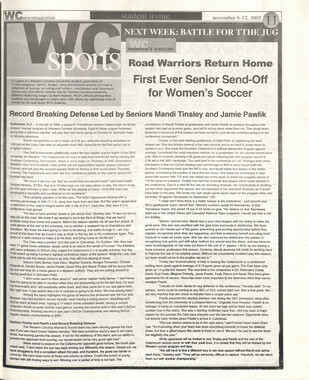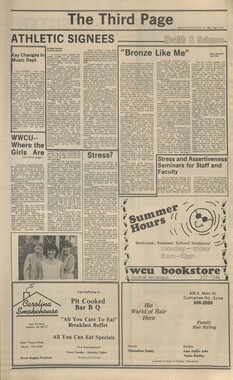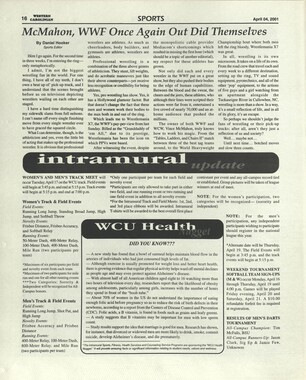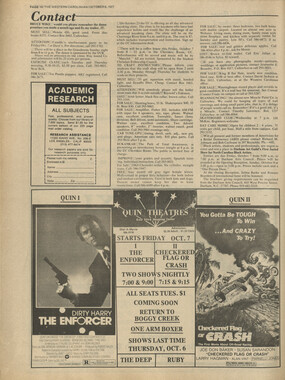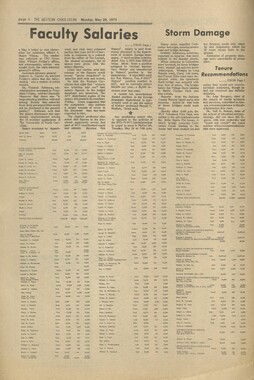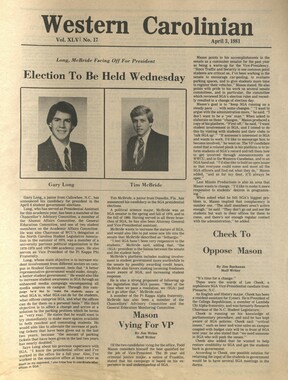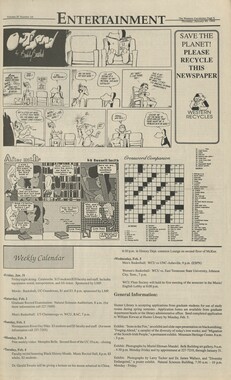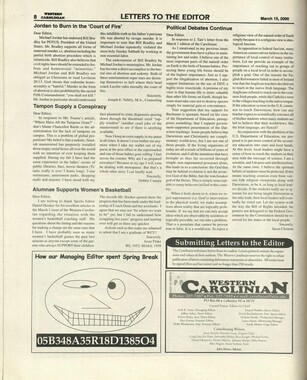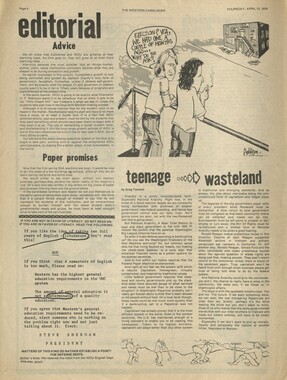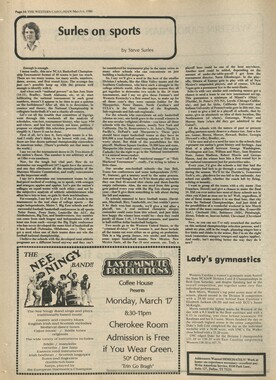Western Carolina University (21)
View all
- Canton Champion Fibre Company (2308)
- Cherokee Traditions (291)
- Civil War in Southern Appalachia (165)
- Craft Revival (1942)
- George Masa Collection (137)
- Great Smoky Mountains - A Park for America (3182)
- Highlights from Western Carolina University (422)
- Horace Kephart (998)
- Journeys Through Jackson (159)
- LGBTQIA+ Archive of Jackson County (90)
- Oral Histories of Western North Carolina (318)
- Picturing Appalachia (6617)
- Stories of Mountain Folk (413)
- Travel Western North Carolina (153)
- Western Carolina University Fine Art Museum Vitreograph Collection (129)
- Western Carolina University Herbarium (92)
- Western Carolina University: Making Memories (738)
- Western Carolina University Publications (2491)
- Western Carolina University Restricted Electronic Theses and Dissertations (146)
- Western North Carolina Regional Maps (71)
- World War II in Southern Appalachia (131)
University of North Carolina Asheville (6)
View all
- Allanstand Cottage Industries (62)
- Appalachian National Park Association (53)
- Bennett, Kelly, 1890-1974 (1463)
- Berry, Walter (76)
- Brasstown Carvers (40)
- Carver, George Washington, 1864?-1943 (26)
- Cathey, Joseph, 1803-1874 (1)
- Champion Fibre Company (233)
- Champion Paper and Fibre Company (297)
- Cherokee Indian Fair Association (16)
- Cherokee Language Program (22)
- Crowe, Amanda (40)
- Edmonston, Thomas Benton, 1842-1907 (7)
- Ensley, A. L. (Abraham Lincoln), 1865-1948 (275)
- Fromer, Irving Rhodes, 1913-1994 (70)
- George Butz (BFS 1907) (46)
- Goodrich, Frances Louisa (120)
- Grant, George Alexander, 1891-1964 (96)
- Heard, Marian Gladys (60)
- Kephart, Calvin, 1883-1969 (15)
- Kephart, Horace, 1862-1931 (313)
- Kephart, Laura, 1862-1954 (91)
- Laney, Gideon Thomas, 1889-1976 (439)
- Masa, George, 1881-1933 (61)
- McElhinney, William Julian, 1896-1953 (44)
- Niggli, Josephina, 1910-1983 (10)
- North Carolina Park Commission (105)
- Osborne, Kezia Stradley (9)
- Owens, Samuel Robert, 1918-1995 (11)
- Penland Weavers and Potters (36)
- Roberts, Vivienne (15)
- Roth, Albert, 1890-1974 (142)
- Schenck, Carl Alwin, 1868-1955 (1)
- Sherrill's Photography Studio (2565)
- Southern Highland Handicraft Guild (127)
- Southern Highlanders, Inc. (71)
- Stalcup, Jesse Bryson (46)
- Stearns, I. K. (213)
- Thompson, James Edward, 1880-1976 (226)
- United States. Indian Arts and Crafts Board (130)
- USFS (683)
- Vance, Zebulon Baird, 1830-1894 (1)
- Weaver, Zebulon, 1872-1948 (58)
- Western Carolina College (230)
- Western Carolina Teachers College (282)
- Western Carolina University (2008)
- Western Carolina University. Mountain Heritage Center (18)
- Whitman, Walt, 1819-1892 (10)
- Wilburn, Hiram Coleman, 1880-1967 (73)
- Williams, Isadora (3)
- Cain, Doreyl Ammons (0)
- Crittenden, Lorraine (0)
- Rhodes, Judy (0)
- Smith, Edward Clark (0)
- Appalachian Region, Southern (3032)
- Asheville (N.C.) (1945)
- Avery County (N.C.) (26)
- Blount County (Tenn.) (200)
- Buncombe County (N.C.) (1680)
- Cherokee County (N.C.) (283)
- Clay County (N.C.) (556)
- Graham County (N.C.) (247)
- Great Smoky Mountains National Park (N.C. and Tenn.) (535)
- Haywood County (N.C.) (3573)
- Henderson County (N.C.) (70)
- Jackson County (N.C.) (4926)
- Knox County (Tenn.) (61)
- Knoxville (Tenn.) (21)
- Lake Santeetlah (N.C.) (14)
- Macon County (N.C.) (421)
- Madison County (N.C.) (216)
- McDowell County (N.C.) (39)
- Mitchell County (N.C.) (135)
- Polk County (N.C.) (35)
- Qualla Boundary (982)
- Rutherford County (N.C.) (78)
- Swain County (N.C.) (2187)
- Transylvania County (N.C.) (270)
- Watauga County (N.C.) (12)
- Waynesville (N.C.) (86)
- Yancey County (N.C.) (72)
- Aerial Photographs (3)
- Aerial Views (60)
- Albums (books) (4)
- Articles (1)
- Artifacts (object Genre) (228)
- Bibliographies (1)
- Biography (general Genre) (2)
- Cards (information Artifacts) (38)
- Clippings (information Artifacts) (193)
- Copybooks (instructional Materials) (3)
- Crafts (art Genres) (622)
- Depictions (visual Works) (21)
- Design Drawings (1)
- Digital Moving Image Formats (2)
- Drawings (visual Works) (185)
- Envelopes (115)
- Exhibitions (events) (1)
- Facsimiles (reproductions) (1)
- Fiction (general Genre) (4)
- Financial Records (12)
- Fliers (printed Matter) (67)
- Glass Plate Negatives (381)
- Guidebooks (2)
- Internegatives (10)
- Interviews (823)
- Land Surveys (102)
- Letters (correspondence) (1070)
- Manuscripts (documents) (618)
- Maps (documents) (177)
- Memorandums (25)
- Minutes (administrative Records) (59)
- Negatives (photographs) (6192)
- Newsletters (1290)
- Newspapers (2)
- Notebooks (8)
- Occupation Currency (1)
- Paintings (visual Works) (1)
- Pen And Ink Drawings (1)
- Periodicals (194)
- Personal Narratives (10)
- Photographs (12977)
- Plans (maps) (1)
- Poetry (6)
- Portraits (4573)
- Postcards (329)
- Programs (documents) (181)
- Publications (documents) (2444)
- Questionnaires (65)
- Relief Prints (26)
- Sayings (literary Genre) (1)
- Scrapbooks (282)
- Sheet Music (2)
- Slides (photographs) (402)
- Songs (musical Compositions) (2)
- Sound Recordings (802)
- Specimens (92)
- Speeches (documents) (18)
- Tintypes (photographs) (8)
- Transcripts (329)
- Text Messages (0)
- A.L. Ensley Collection (275)
- Appalachian Industrial School Records (7)
- Appalachian National Park Association Records (336)
- Axley-Meroney Collection (2)
- Bayard Wootten Photograph Collection (20)
- Bethel Rural Community Organization Collection (7)
- Blumer Collection (5)
- C.W. Slagle Collection (20)
- Canton Area Historical Museum (2110)
- Carlos C. Campbell Collection (564)
- Cataloochee History Project (64)
- Cherokee Studies Collection (4)
- Daisy Dame Photograph Album (5)
- Daniel Boone VI Collection (1)
- Doris Ulmann Photograph Collection (112)
- Elizabeth H. Lasley Collection (1)
- Elizabeth Woolworth Szold Fleharty Collection (4)
- Frank Fry Collection (95)
- George Masa Collection (173)
- Gideon Laney Collection (452)
- Hazel Scarborough Collection (2)
- Hiram C. Wilburn Papers (28)
- Historic Photographs Collection (236)
- Horace Kephart Collection (861)
- Humbard Collection (33)
- Hunter and Weaver Families Collection (1)
- I. D. Blumenthal Collection (4)
- Isadora Williams Collection (4)
- Jesse Bryson Stalcup Collection (47)
- Jim Thompson Collection (224)
- John B. Battle Collection (7)
- John C. Campbell Folk School Records (80)
- John Parris Collection (6)
- Judaculla Rock project (2)
- Kelly Bennett Collection (1482)
- Love Family Papers (11)
- Major Wiley Parris Civil War Letters (3)
- Map Collection (12)
- McFee-Misemer Civil War Letters (34)
- Mountain Heritage Center Collection (4)
- Norburn - Robertson - Thomson Families Collection (44)
- Pauline Hood Collection (7)
- Pre-Guild Collection (2)
- Qualla Arts and Crafts Mutual Collection (12)
- R.A. Romanes Collection (681)
- Rosser H. Taylor Collection (1)
- Samuel Robert Owens Collection (94)
- Sara Madison Collection (144)
- Sherrill Studio Photo Collection (2558)
- Smoky Mountains Hiking Club Collection (616)
- Stories of Mountain Folk - Radio Programs (374)
- The Reporter, Western Carolina University (510)
- Venoy and Elizabeth Reed Collection (16)
- WCU Gender and Sexuality Oral History Project (36)
- WCU Mountain Heritage Center Oral Histories (25)
- WCU Oral History Collection - Mountain People, Mountain Lives (71)
- WCU Students Newspapers Collection (1923)
- Western North Carolina Tomorrow Black Oral History Project (69)
- William Williams Stringfield Collection (2)
- Zebulon Weaver Collection (109)
- African Americans (390)
- Appalachian Trail (35)
- Artisans (521)
- Cherokee art (84)
- Cherokee artists -- North Carolina (10)
- Cherokee language (21)
- Cherokee pottery (101)
- Cherokee women (208)
- Church buildings (190)
- Civilian Conservation Corps (U.S.) (114)
- College student newspapers and periodicals (2012)
- Dams (115)
- Dance (1023)
- Education (222)
- Floods (63)
- Folk music (1015)
- Forced removal, 1813-1903 (2)
- Forest conservation (220)
- Forests and forestry (1198)
- Gender nonconformity (4)
- Great Smoky Mountains National Park (N.C. and Tenn.) (181)
- Hunting (47)
- Landscape photography (25)
- Logging (122)
- Maps (83)
- Mines and mineral resources (9)
- North Carolina -- Maps (18)
- Paper industry (38)
- Postcards (255)
- Pottery (135)
- Railroad trains (72)
- Rural electrification -- North Carolina, Western (3)
- School integration -- Southern States (2)
- Segregation -- North Carolina, Western (5)
- Slavery (5)
- Sports (452)
- Storytelling (243)
- Waterfalls -- Great Smoky Mountains (N.C. and Tenn.) (66)
- Weaving -- Appalachian Region, Southern (280)
- Wood-carving -- Appalachian Region, Southern (328)
- World War, 1939-1945 (174)
Western Carolinian Volume 56 Number 24
Item
Item’s are ‘child’ level descriptions to ‘parent’ objects, (e.g. one page of a whole book).
-
-
Volume 56 Number 24 Features The Western Carolinian Page 4 — Thursday, April 11, 1991 ' Adult Children of Alcoholics Dr. John Ritchie Contributing Writer In the past the recognition and treatment of alcoholism revolved around the alcoholic drinker. Understanding and treatment later progressed to include the spouse, and then the family, of thealcohol abuser. Recently there has been a lot of attention given to the Adult Children of Alcoholics because such a large number of children are similarly and significantly affected by living in an alcoholic home. The attitudes and behaviors learned in an alcoholic home often continue when the child becomes an adult. Many children of alcoholics are unaware of how similar to the alcohol abuser their attitudes and behaviors are. They think they're very different since they don't drink abusively themselves. Children of alcoholics grow up in similar environments. I invite you to read the following characteristics that are common in an alcoholic home and in an Adult Child of an Alcoholic. Mixed Messages that Children Get Growing up in an Alcoholic Home 1. LOVE/REJECTION - "I love you but don't bother me." In adult life these children are attracted to relationships where they are rejected because they equate love with rejection. 2. YOU CAN COUNT ON ME/DISAPPOINTMENT - "I'll be there for you...next time." The adult child learns not to want or expect things...they deny their needs because they don't want to be disappointed when they aren't met. 3. ALWAYS TELL ME THE TRUTH/I DON'T WANT TO KNOW - The child is told to always tell the truth...as long as it's something the parents want to hear. 4. EVERYTHING IS FINE/ SENSE OF HOPELESSNESS - The child is told verbally that everything is fine or will be alright, but the family atmosphere is one of hopelessness, depression, and anxiety. The adult child suffers from distortions in his perceptions of reality, feels powerless over his life, is often depressed and distrusts his own judgments. 5. BLAME ALCOHOLISM/ EXCUSE THE BEHAVIOR - The child is told by others not to get mad at the parent - "It wasn't his adult, he was just drunk." The child learns - "If I am drunk, I can do whatever I want." Profile of an Adult Child of an Alcoholic: 1. GUESSES AT WHAT NORMAL IS - DOESN'T RECOGNIZE WHAT "NORMAL" IS WHEN HE/SHE SEES IT - Is used to stuffing and denying feelings - doesn't know they are O.K. 2. HAS DIFFICULTY IN FOLLOWING A PROJECT FROM BEGINNING TO END - Learned it was the "intentions" that count...not the behavior. 3. LIES WHEN IT WOULD BE JUST AS E AS Y TO TELL THE TRUTH - Does this automatically without guilt because truth doesn't have value. 4. JUDGES HIMSELF WITHOUT MERCY - Is never good enough. 5. HE/SHE HAS DIFFICULTY HAVING FUN - Never learned how to play. 6. TAKES HIMSELF TOO SERIOUSLY - Life is hard work. 7. HAS DIFFICULTY WITH INTIMATE RELATIONSHIPS - The fears of abandonment are too great to ease into a relationship. 8. CONSTANTLY SEEKS APPROVAL AND AFFIRMATION - Can never give it to himself...looks to others for affirmation. 9. OVERREACTS TO CHANGES OVER WHICH HE HAS NO CONTROL - As a child, had no control over changes that often threatened safety, security, survival. 10. IS SUPER-RESPONSIBLE OR SUPER-IRRESPONSIBLE - Can't say NO because of need for approval - sets no limits, prime candidates for burnout. 11. HAS NO SENSE OF COOPERATION/WORKING WITH OTHERS - Is used to doing things alone and for himself, that's how he survived in a chaotic family. 12. IS EXCEEDINGLY LOYAL EVEN IN THE FACE OF EVIDENCE THE LOYALTY Tips for planet Earth J o GOVERNMENT J o B S • • * JOBS $16,040 - $59,230/yr. B S • • * o Call o s t i 1-900-468-2437 24 Hour Hotline $2.95 per mln. o S * • . . .JOBS. . .JOBS ... Diane MacEachern Contributing Writer Pacific Gas and Electric (PG&E), the nation's largest investor-owned energy utility, has launched a $2 billion, ten year program to promote energy efficiency. In one of the most innovative energy saving programs in the nation, PG&E is offering the following: Between June 1 and September 30,1991, residential customers who purchase new energy-efficient refrigerators will receive cash rebates ranging from $50 to $150. Until December 31, customers can receive rebates ranging from $125 to $400 for purchasing energy-efficient central air conditioners. A $4 discount coupon to be applied toward the purchase of a low-flow showerhead is available at many retail outlets selling the water- conservation devices. The coupons are displayed near the product for immediate redemption at the time of Saturday, April 13 LMP is sponsoring two great trips to choose from Biltmore House Spring Festival of Flowers spend a day at Biltmore House and enjoy their beautiful Festival of Flowers in the Biltmore Gardens. Sign up first floor UC $ 12 16 for students $ 1 U for faculty and staff call 7479 or 7FUN for additional info Trail Riding in the Great Smoky Mountains See beautiful waterfalls, creeks, mountains and spring wildflowers. purchase. Discount coupons are also being offered toward the purchase of furnace filters and water-heater blankets. Additional rebates are being offered to encourage customers to buy energy-saving compact fluorescent lightbulbs and plant shade trees. PG&E also will inspect single-family homes and recommend ways to use energy more efficiently. For low-income single families, and those who live in mobile homes and multi-family dwellings, free weath- erization and minor home repairs such as caulking, weatherstripping and insulating ceilings are available. Equally ambitious programs are being offered to commercial, industrial and agricultural customers. Through these and other programs, PG&E hopes by the year 2000 to save enough electricity to meet the average needs of about 2.5 million Californians, offsetting the need to burn the equivalent of 68 million barrels of oil and reducing the emissions that cause air pollution by millions of tons. For more information, contact the Pacific Gas and Electric Company, 77 F ale St., San Fran- ci„;o, California 94106; (415) 973- 5930. In a recent column, I cautioned against junking used refrigerators until the ozone-depleting chlorofluorocarbons (CFCs) in the freezer and insulation could be recycled. It appears that option is now available in at least four states. Appliance Recycling Centers of America, Inc. has set up operations in Connecticut, Florida, Wisconsin and Minnesota. The centers recycle fourteen different appliances: refrigerators, stoves, freezers, dishwashers, garbage disposals, trash compactors, washers, dryers, water heaters, furnaces, humidifiers, dehumidifiers, microwave ovens and air conditioners (both central and window units). For about $25, the centers will collect the appliances and take them back to their shop. The capacitator, a small device that starts or runs the appliance, is removed. Any PCBs, highly toxic coolants sometimes found in the oil, are also removed and later incinerated at a hazardous-waste treatment facility. The CFCs, present in refrigerators, freezers, dehumidifiers and air conditioners, are drained, distilled and bottled for resale to appliance repair and service centers. What remains of the appliance is then taken to a metal shredder and ultimately made into a new product. In addition to servicing consumers, the centers contract with local governments, waste haulers, appliance retailers and utility companies that hope to save energy by getting old and inefficient second refrigerators, freezers or air conditioners out of someone's basement. Appliance recycling has many benefits. In addition to capturing CFCs and PCBs and saving energy, recycling appliances helps extend the capacity of shrinking landfills. Indeed, several states, Minnesota, Wisconsin, Florida, ISN'T DESERVED - 13. TENDS TO LOOK FOR IMMEDIATE RATHER THAN DELAYED GRATIFICATION - Learned as a child...if you wait, you don't get it! The above information is further discussed in Jane Geringer Woititz's Adult Children of Alcoholics. If you had parents, grandparents, or relatives who were alcoholic, and you can identify with these characteristics, please consider getting help at the Counseling and Psychological Services Center, 7469, 114 Scott. We offer free and confidential individual counseling and one of our groups, "Confronting the Alcoholic System", is to help Adult Children of Alcoholics and others (partners, roommates, and friends) look at ways to emotionally free and heal themselves from the confusing and hurtful interactions maintained in an alcoholic system. Connecticut, Massachusetts, North Carolina, Louisiana, Kansas and Missouri have passed laws prohibiting the landfilling of appliances. Minnesota is also considering legislation that would require retailers to take back the old appliance when delivering a new one to the consumer. Beginning July 1, 1992, amendments recently passed to the Clean Air Act will prohibit CFC venting during appliance service, repair and disposal. For more information, write to Appliance Recycling Centers of America, Inc.,2601 Broadway Rd., N.E., Minneapolis, Minnesota 55413. Chlorinated hydrocarbons, according to the Environmental Protection Agency, are a class of persistent, broad-spectrum insecticides that linger in the environment and accumulate in the food chain. Among them are DDT, aldrin, dieldrin, hep- tachlor, chlordane, lindane, endrin, mirex, hexachloride and toxaphene. Many of these are known or suspected carcinogens. You may find them in the chemicals sprayed on lawns, gardens or crops. Compost, as defined by the EPA, is a mixture of garbage, degrad- able trash and soil formed when bacteria in the soil break down the garbage into organic fertilizer. At an individual level, compost is usually made form kitchen scraps and yard debris. Some communities are experimenting with projects to compost paper and cardboard, along with food waste. Send questions about the environment to Tips for Planet Earth, c/ o Washington Post Writers Group, 1150 15th St. NW, Washington, DC 20071-9200. Questions of general interest will be answered in the column; individual answers cannot be provided. price includes transportation, guides, horses, equipment nad lunch. Sign up first floor UC $20 for WCU students $30 for Faculty and Staff Horseback Riding call 7206 or 7479 for more information Room Sign-up For Academic Year 1991-92 Returning Students Same Room Monday, April 29, 9:00 a.m. - 4:00 p.m. Same Area Different Room Tuesday, April 30, 9:00 a.m. - 4:00 p.m. Sign-Up Locations For Monday and Tuesday Albright, Benton and Harrill: Harrill Lobby Helder and Leatherwood: Helder Area Coordinator's Offc. Buchanan, Reynolds and Madison: Buchanan Lobby Scott and Walker: Scott Area Coordinator's Offc. Different Area Thursday, May 2, 10:00 a.m. - 2:00 p.m. LOCATION: Lower level of Dodson Cafeteria Off Campus Students Friday May 3, 8:03 a.m. - 5:00 p.m. LOCATION: Housing Office, Dodson Annex All Assignments are on a first come, first served basis. For more info., contact: Housing Office-Dodson Annex 227-7303
Object
Object’s are ‘parent’ level descriptions to ‘children’ items, (e.g. a book with pages).
-
The Western Carolinian is Western Carolina University's student-run newspaper. The paper was published as the Cullowhee Yodel from 1924 to 1931 before changing its name to The Western Carolinian in 1933.
-
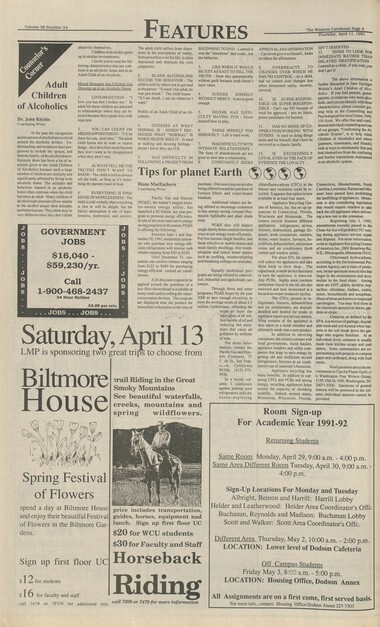

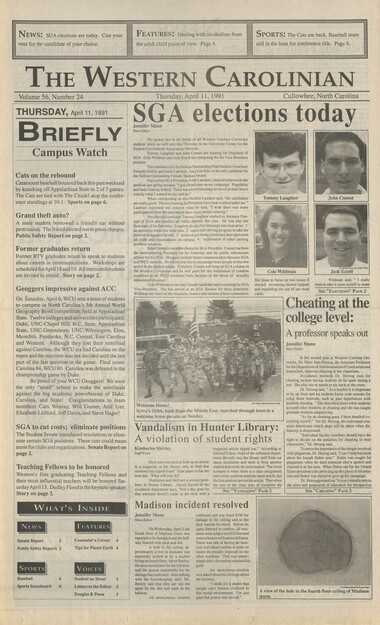
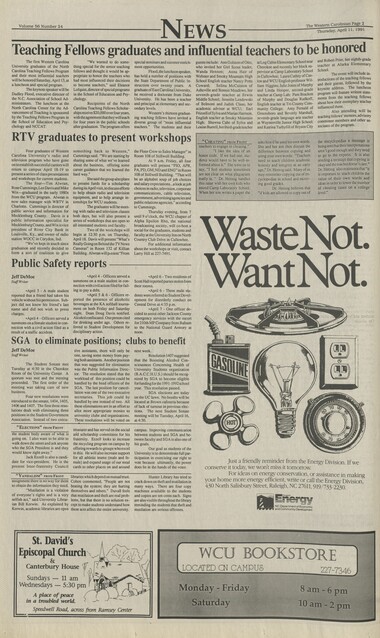
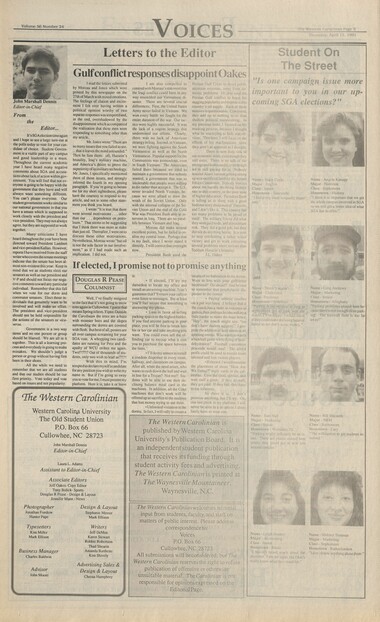
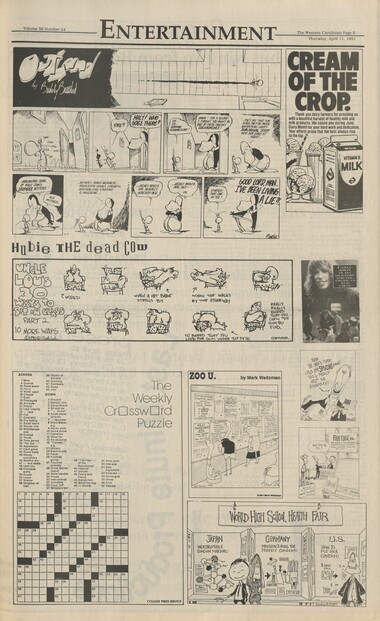
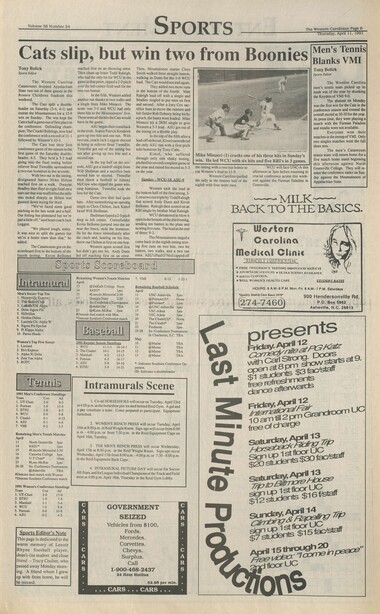
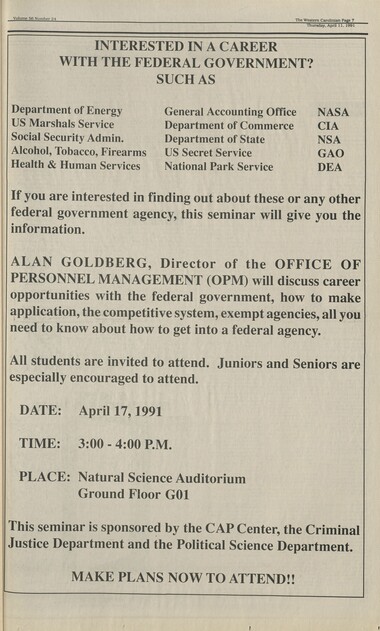
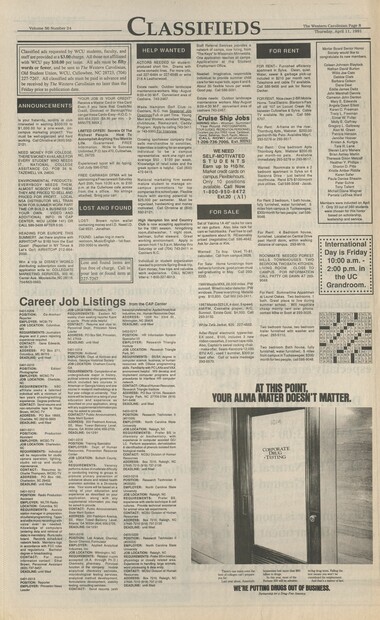

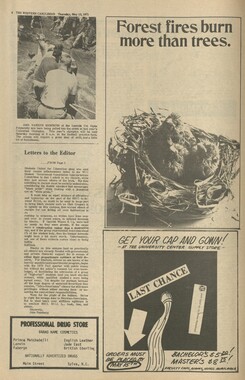
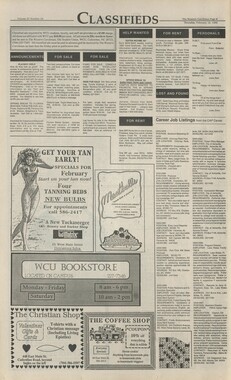

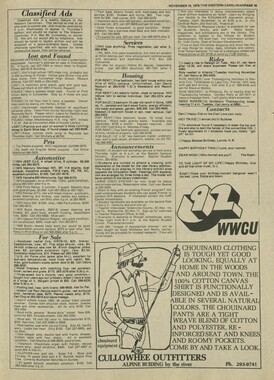
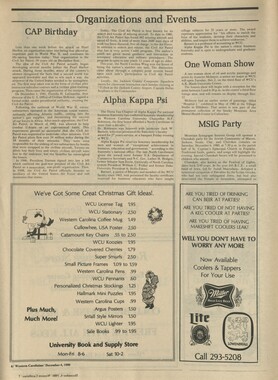


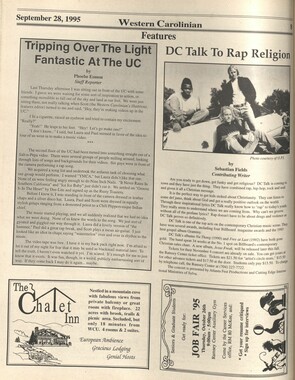

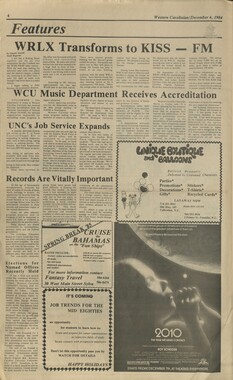
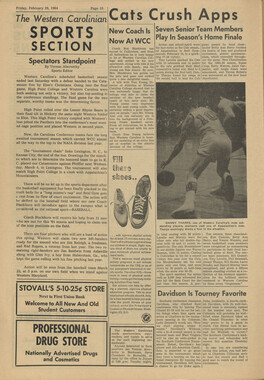
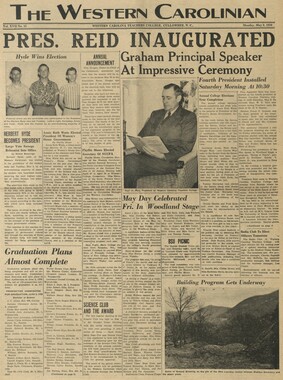
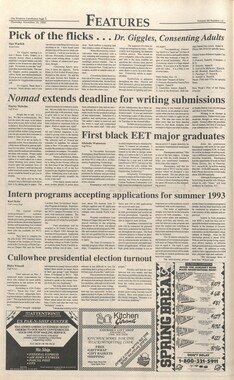
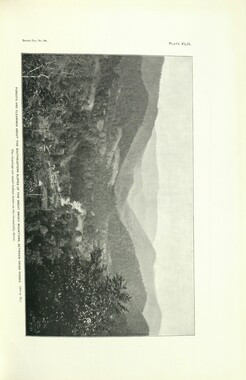
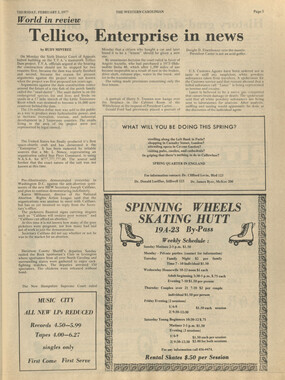
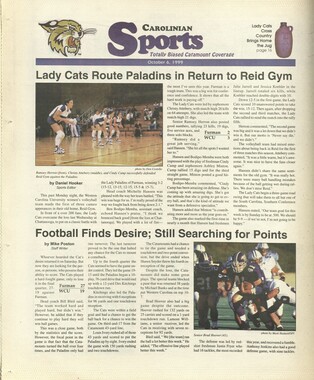
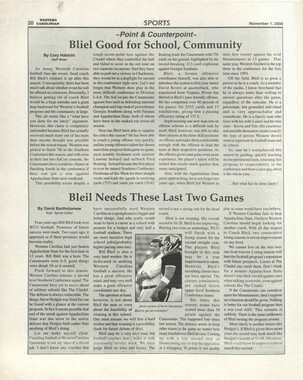
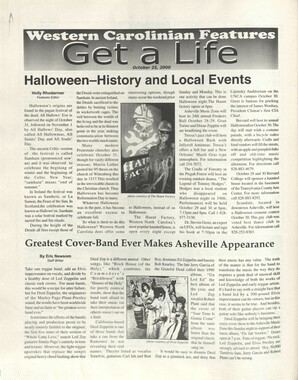
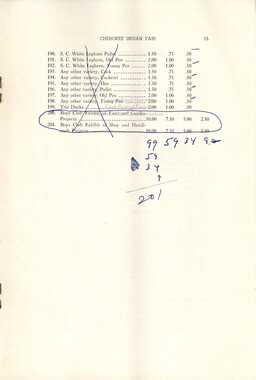
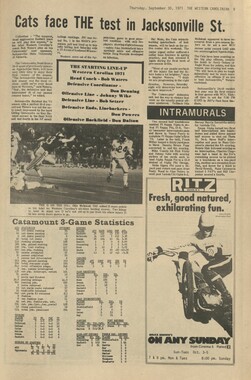
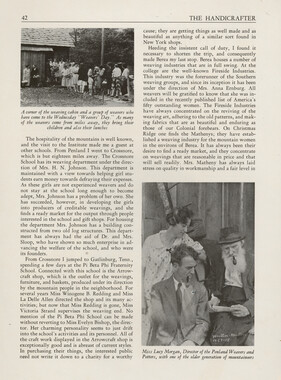



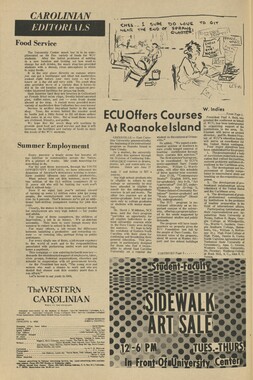
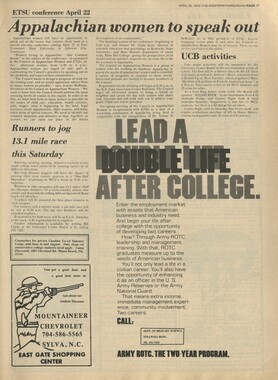
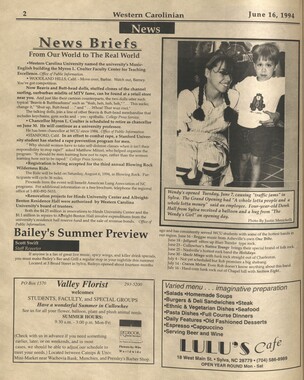


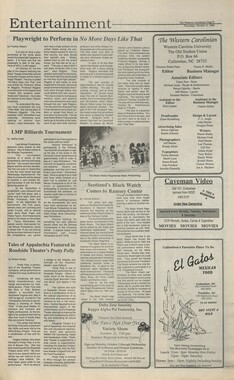


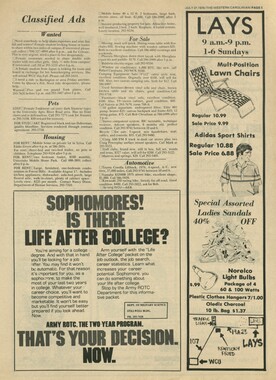
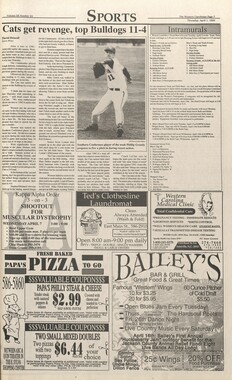

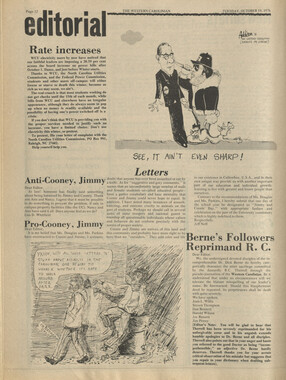

![hl_westerncarolinian_2004_[vol69_no04]_15.jpg](/media/w400h300/wcu_publications/hl_westerncarolinian_2004_[vol69_no04]_15.jpg)
